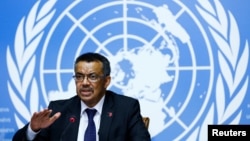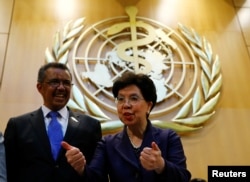African delegates celebrated with ululations and high-fives when Ethiopia's Dr. Tedros Adhanom Ghebreyesus was elected director-general of the World Health Organization earlier this week in Geneva. Now, Tedros faces a slew of challenges as he takes the helm of a sprawling organization with more than 7,000 employees in 150 countries, responsible for improving health care around the world.
Tedros, who goes by his first name, won by a clear majority, defeating British and Pakistani candidates in the first WHO election decided by member countries. He will become the first African to head the WHO when he takes the reins July 1.
"In our view, this victory is a victory for Ethiopia. It is a victory for Africa and a victory for Dr. Tedros personally," Meles Alem, an Ethiopian Foreign Ministry spokesperson, told VOA's Amharic service.
"Dr. Tedros will focus on promoting universal coverage, ensuring the health of women and children, and expansion of health in tandem with climate, which [is disproportionately] affecting Africa as compared to the developed world."
Funding challenges
Tedros will inherit an agency with a funding shortfall of approximately $2.2 billion. The WHO has seen dramatic cuts from traditional donors such as the United States.
"Its budget has been cut radically year after year, after year," Laurie Garrett, a senior fellow for global health at the Council on Foreign Relations, told VOA. She said donations that once went to the WHO now go to other health-related agencies such as the Global Fund to Fight AIDS, Tuberculosis and Malaria.
"In a sense, they're competing for resources and for the support of governments generally and, specifically, for the support of the most powerful governments in the world, such as the United States, the United Kingdom, China and Germany," Garrett said.
Tedros doesn't see it as a competition. He wants to broaden the WHO's funding strategy and raise money not only for the agency but for organizations that share common goals, including the Global Fund, the World Bank and Gavi, the Vaccine Alliance.
"The WHO's ability to respond cannot be constrained by its resources," Tedros wrote in an opinion piece published in the medical journal The BMJ. "We will need to pursue increased and more flexible funding, broadening the WHO's funding sources and moving away from vertical funding to basket funds that can be used for broad health priorities determined by its member states."
Early warning systems
Tedros has said he will prioritize improvements to the pandemic early warning and response systems in Africa and around the world. The WHO waited nine months after the first reported case of Ebola in December 2013 to declare a state of emergency in West Africa — a widely criticized decision.
To address this, the WHO is implementing an emergency response program, and it plans to encourage member states to conduct regular simulations of their epidemic response procedures.
"You can develop that attitude of responding to epidemics when you do simulations," Tedros said during a press conference after his win. "By [conducting] simulations, you can prepare the mind. You can prepare the logistics. You can refine your processes."
Tedros pointed to quick responses to an ongoing Ebola outbreak in the Democratic Republic of Congo and an outbreak of an unknown illness in Liberia this year as evidence that the continent has learned lessons from the 2014-15 Ebola outbreak.
Bureaucracy struggles at agency
Tedros' largest challenge may be managing the unique bureaucracy of the WHO. Under its constitution, the organization is divided into six regional offices that operate mostly on their own. A report by The Economist said the directors of these offices are selected by local ministers of health who continue to influence them after they take office.
"The director-general has very little control over the organization's budget, human resources and work in countries, including in case of emergencies," Peter Piot of the London School of Hygiene and Tropical Medicine told The Economist.
Without specifically addressing this problem, Tedros said many of the WHO staffers he has spoken with have emphasized the need for the organization to have a common vision. He said he aims to be a reformer.
Garrett said implementing these reforms will be easier said than done.
"What we haven't seen — what hasn't been put to the test — are a whole range of other great challenges that he will certainly face," she said. "Can he raise billions of dollars? ... Does he have the skills to deal with the balance between the priorities for things like cancer, heart disease — the non-infectious diseases — versus the priority set by potential contagious catastrophes? We'll see."






